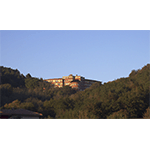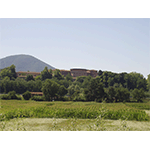Ex Ospedale psichiatrico di Fregionaia [Former Psychiatric Hospital of Fregionaia]
In 1769 the Senate of the Republic of Lucca formally requested Pope Clement XIV (Lorenzo Ganganelli) to suppress the Monastery of the Lateran Canons of Santa Maria di Fregionaia. In the following year, after other "supplications", the Pope, in a brief called "Bonus ille pastor aeternus", sanctioned the suppression of the Monastery, on condition that the ensuing profit be utilised in works of public welfare at the Lucca Hospital of San Luca della Misericordia. It was thus decided to designate the structure to the hospitalisation and asylum of the mentally ill.
From 1772 to 1775 the first work of converting the former monastic complex into an insane asylum structure began. Lorenzo Bartolini, Rector of the Hospital of San Luca della Misericordia, began to set the bases for efficient organisation of the institution, by sending some assistants to Florence to observe the methods employed at the Santa Dorotea "madhouse". On April 20, 1773, with the arrival of the personnel, the Psychiatric Hospital of Fregionaia was opened as a branch of the municipal Hospital of San Luca della Misericordia, and the next day it received the first eleven patients, coming from the municipal prison of Torre.
During the hospital’s first years, the patients were merely kept in custody, while starting from the second decade of the 19th century, thanks to the work of Giovanni Buonaccorsi, manual occupation was adopted as rehabilitation therapy. While the men engaged mainly in agricultural work, the women were employed in the occupation of cleaning and putting in order. Among the most significant therapeutical measures were, in 1860, the purchase of a keyboard organ and the opening of a dance hall, almost in anticipation of modern music therapy.
In the second half of the 20th century the Lucca institution was linked to the name of the psychiatrist and author Mario Tobino, who for many years held the role of chief physician in the women’s department. The Viareggio-born author based many of his novels on his professional experience, such as Le libere donne di Magliano (Florence, 1953), Per le antiche scale (Milan,1972), Gli ultimi giorni di Magliano (Milan, 1982) and Il manicomio di Pechino (Milan, 1990).
Today the imposing building and its surrounding park, in a poor state of conservation, are awaiting assignment to a new destination.
****************************
Texts by Graziano Magrini
English translation by Catherine Frost
Last update 25/feb/2008





